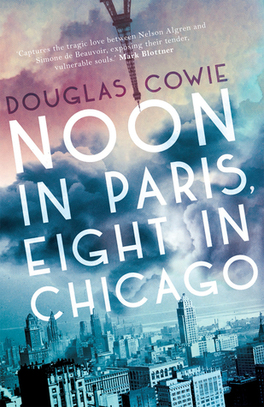I loved the voice in the opening, when Nelson heats up his beef stew for the seventh dinner running, but I did grow weary (as perhaps the lovers did themselves eventually) of the countless taxi rides and glasses of beer and whiskey. Although the author seemed more sympathetic to de Beauvoir than to Algren, with his petulant sulks and silences, she does cry a lot in the novel and (not that there’s necessarily any contradiction between cleverness and emotional lability, or even anything wrong with shedding tears), without much exploration of their intellectual sides, I felt I had to take on trust that she was one of the world’s leading thinkers. I don’t know where the balance lay between fact and invention, but I was shocked and appalled that de Beauvoir, despite her apparent sexual confidence, cannot ask Algren to use contraception (as Mr A said when I told him, they’re not called French letters for nothing) and has to ask a friend to take her to a New York doctor, feeling “bewilderingly stupid, because of France, because of Catholic, backward France, not quite knowing what to do” (p70), to be fitted with a diaphragm – although that might be one of the many contradictions of women’s lives that spurred her writing.
Those quibbles aside, Noon in Paris, Eight in Chicago is a fascinating portrait of post-war bohemian life and the pressures of a long-distance relationship, especially when those involved have competing passions and competing egos. Thanks to Myriad Editions for my review copy.
#############################################################
When his mother’s benefactor dies, seventeen-year-old Franz is obliged to leave his home in rural Austria for a job as a Viennese tobacconist’s apprentice. There he forms an unlikely friendship with that famous cigar-smoker Sigmund Freud, who advises the young man to follow his dreams both literally in writing them down and figuratively in pursuing the slightly older Bohemian woman to whom he has formed an attraction. The story starts in the late summer of 1937 and, before too long, Hitler has annexed Austria and Franz finds the city changing in most uncomfortable ways. In understated slightly ironic prose (a tone reminiscent to me of The Winterlings), this is a moving account of a simple country boy’s coming of age in a nightmare world. However, despite its important premise, I didn’t connect with this novel as much as I’d hoped. Translated from the German by Charlotte Collins, The Tobacconist is published by Picador (thanks for my review copy) with one of the most gorgeous covers I’ve seen this year! (Not that Cowie’s isn’t rather nice too!)
For another post on fictional celebrities, follow the link.























 RSS Feed
RSS Feed





















